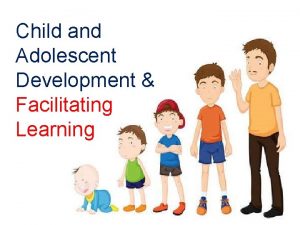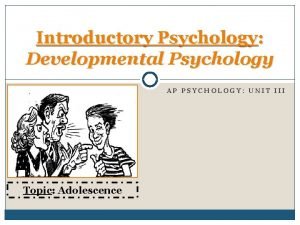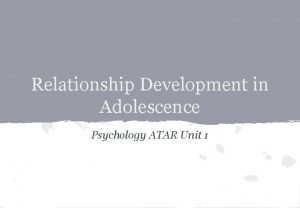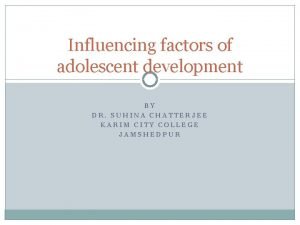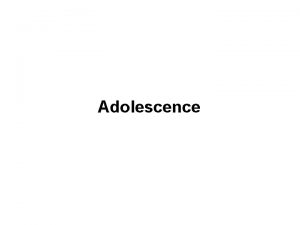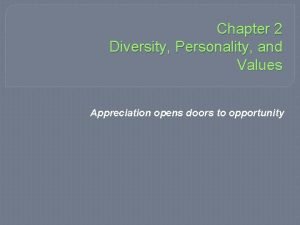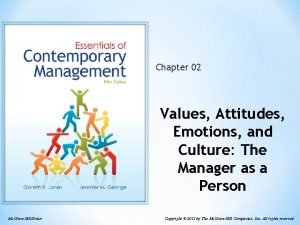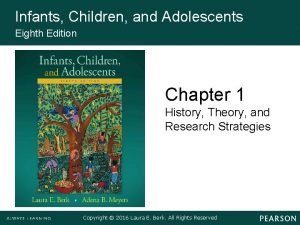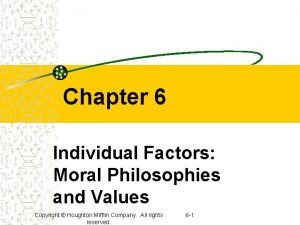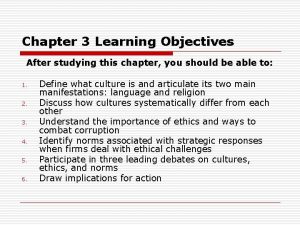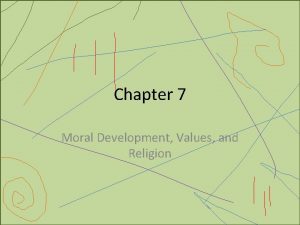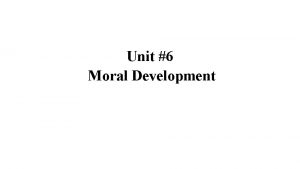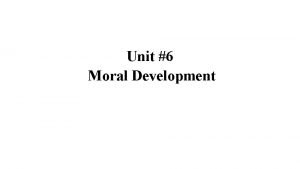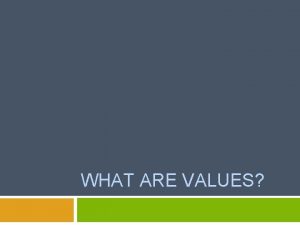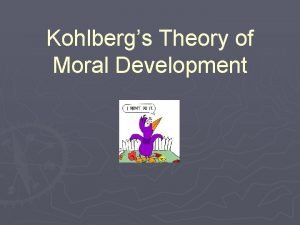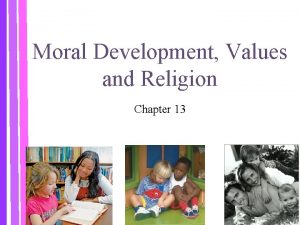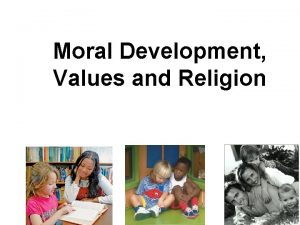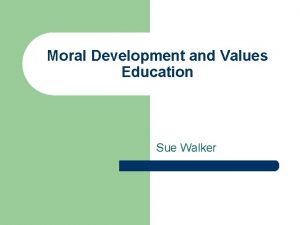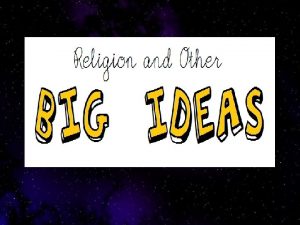Moral Development Values and Religion ADOLESCENT PSYCHOLOGY Moral











- Slides: 11

Moral Development, Values, and Religion ADOLESCENT PSYCHOLOGY

Moral Development � Thoughts, feelings and behaviors regarding standards of right and wrong � Both interpersonal and intrapersonal �When being social and when not engaged with others � Values: beliefs and attitudes about the way things should be.

Moral Thought Piaget – children’s moral development � Lawrence Kohlberg – Moral development based on moral reasoning � �Studied using vignettes (11 moral dilemmas) � 3 levels of moral development �Each level has 2 stages �Go from values being external and superficial to more internal and mature as one progresses through levels and stages � Lets look at Kohlberg’s model of moral development…

Kohlberg – Level 1: Preconventional Reasoning Lowest level, focused on reward and punishment �Before age 9 Stage 1: punishment & obedience orientation � Stage 2: Individualism, instrumental purpose, and exchange � �What is right involves an equal exchange �Nice to you so you will be nice to me �“What’s in it for me? ”

Kohlberg – Level 2: Conventional Reasoning Second, intermediate level – abide by internal standards, but there are external standards of others � Most adolescents are reasoning in conventional ways; stage 3 with some stage 2 and stage 4 � Stage 3: Mutual interpersonal expectations, relationships, and interpersonal conformity � Value trust, caring, and loyalty as basis of what is “right” � Often adopt parent’s values at this stage � Seek to be seen as “good” � Stage 4: Social systems morality � Moral judgment based on social order, law and justice � Understanding that for community to work we need laws

Kohlberg – Level 3: Postconventional Reasoning Highest level, morality becomes more internal � Sees alternative moral courses � Explores the moral options � Decides on personal moral code � Stage 5 – early 20 s and Stage 6 is questionable for various reasons � Stage 5: Social contract or utility and individual rights � Values, rights, and principles are basis of moral reasoning � Evaluate laws and social systems based on how they uphold and protect fundamental rights � Stage 6: Universal ethical principles � Moral reasoning based on universal human rights � When law and conscience conflict, individual will follow conscience � Individual takes personal risks to stand by their morality

Kohlberg’s Theory Stage 6 has been removed from scoring manual Moral reasoning changes very slowly and gradually (2009) Moral orientation – cognitive development and exposure to appropriate social experiences � Some believe that morality develops in similar ways to cognitive development (equilibrium and conflict) � So…moral thought can be moved to higher level through exposure to models or discussion that is more advanced than the adolescent’s level � � Emphasized importance of peer give-and-take interactions in development of higher moral reasoning (including role taking and challenging conversations) � Parent-child interactions: allow & encourage conversations about value-laden topics � Critics: not enough focus on behavior � May be able to reason, but what do they DO…

Moral Reasoning Justice vs. care perspectives (Carol Gilligan) �Care perspective not addressed adequately in Kohlberg’s theory �Emphasizes relationships and concern for others �Gender Social Conventional Reasoning: thoughts about social consensus and convention

Moral Behavior & Feeling � � Processes of reward, punishment, and imitation Social Cognitive Theory – difference between moral competence (ability to produce moral bxs) and moral performance (enactment of bxs in specific situations) � Self-control, self-regulation Prosocial Behavior: altruism, forgiveness, gratitude � Moral Feelings: empathy develops around 10 -12 years of age � � Sympathy, empathy, admiration and self-esteem � Anger, outrage, shame and guilt

Contexts of Moral Development: Parenting � Supportive parenting Encouraging to question and expand moral reasoning � Opportunity to learn about other’s perspectives � Included in family decision making process � � Higher level of moral reasoning in adolescence � Child-rearing Techniques (discipline) � Love withdrawal anxiety � Power assertion hostility � Induction – use of reason and explanation of consequences for others from adolescent’s behavior

 Facilitating learning child and adolescent development
Facilitating learning child and adolescent development Adolescence ap psychology
Adolescence ap psychology Dexter dunphy 5 stages
Dexter dunphy 5 stages What factors influence adolescent development
What factors influence adolescent development Physical development in adolescence
Physical development in adolescence Western religion vs eastern religion
Western religion vs eastern religion Instumental values
Instumental values An individual's enduring tendency to feel
An individual's enduring tendency to feel Jung animus
Jung animus Berk 8th edition
Berk 8th edition Moral philosophy refers to
Moral philosophy refers to Western vs eastern values
Western vs eastern values
